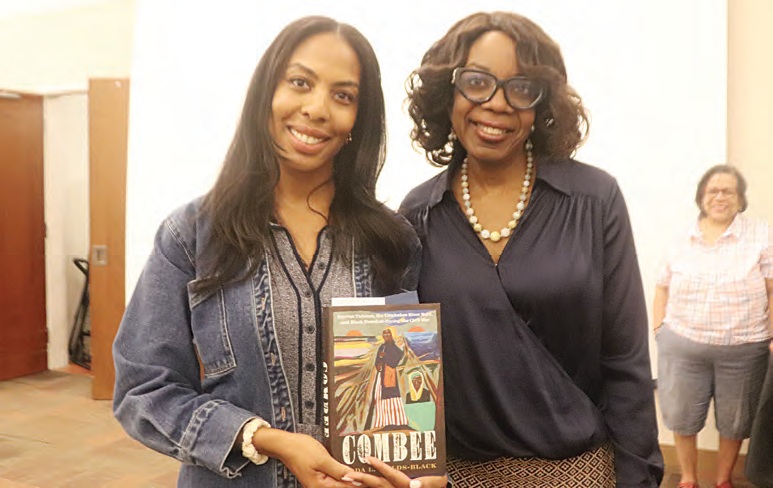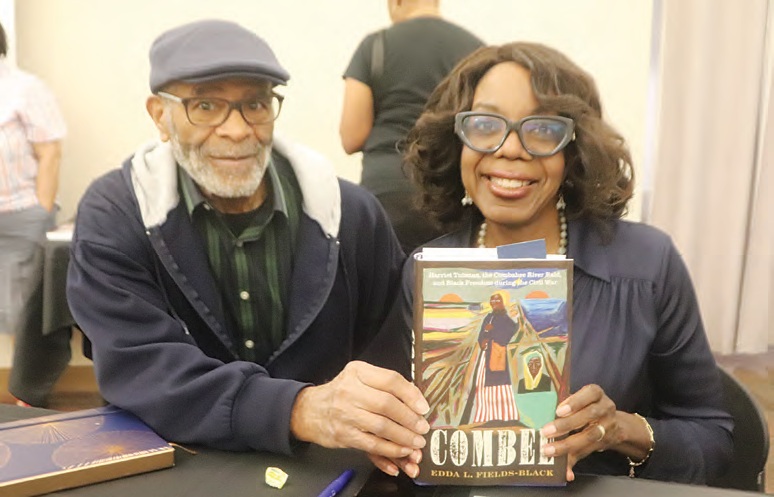
Dr. Edda Fields-Black wins Pulitzer Prize for History
Project Edda Fields-Black (Photo Courtesy Carnegie Mellon University)
Dr. Edda Fields-Black was just minding her own business, in the airport in Monterrey, California, preparing to board a flight on Monday, May 5, when she got the call.
“It was a very pleasant shock,” Dr. Fields-Black told the New Pittsburgh Courier. “I was elated. Absolutely elated.”
It’s not often that you get a call stating that you’ve won a Pulitzer Prize.
But Dr. Fields-Black got the call.
The Pulitzer Prize is considered the highest award in journalism, arts and letters. The year 2025 was the 109th year for the Pulitzer Prize awards, and in the “History” category, the judges were looking “for a distinguished and appropriately documented book on the history of the United States,” as it’s stated on its website. The prize? $15,000, even though the notoriety and status has proven to surpass the financial reward. Dr. Fields-Black won for her book, “Combee: Harriet Tubman, The Combahee River Raid, and Black Freedom during the Civil War.”
The book is a richly-textured and revelatory account of a slave rebellion that brought 756 enslaved people to freedom in a single day, weaving military strategy and family history with the transition from bondage to freedom.
“I am truly grateful to the Pulitzer board for recognizing the Combahee River Raid and Harriet Tubman, the Second South Carolina Volunteers and the Combahee freedom seekers’ quest for freedom as a significant chapter in our nation’s history,” said Dr. Fields- Black in a CMU release, dated May 5. “I am humbled to bring the untold stories and unheard voices of formerly enslaved people to life. Thank you to the museums, research centers, archives, National Park Service, U.S. Fish and Wildlife Service, descendants of Harriet Tubman, the Combahee freedom seekers and planters, current Combahee River landowners and the entire team at OUP (Oxford University Press) for partnering with me in making ‘COMBEE’ possible.”
Seemingly overnight, “Dr. Edda Fields-Black” became a household name in the Pittsburgh region. Truth is, she’s been doing the work for decades. The Miami, Florida, native came to Pittsburgh in 2001, after earning her doctorate at the University of Pennsylvania. Today, she’s a professor in the Carnegie Mellon University Department of History and the Director of the Dietrich College Humanities Center at Carnegie Mellon. Her research specialty is the trans-national history of West African rice farmers, peasant farmers in pre-colonial Upper Guinea Coast and enslaved laborers on rice plantations in the antebellum South Carolina and Georgia Lowcountry.
“The Combahee River was the largest slave rebellion in U.S. history, the largest and most successful,” Dr. Fields-Black told the Courier after she gave a presentation to about 60 people at the Penn Hills Library, May 12. “Harriet Tubman, her group of spy scouts and pilots, the 2nd South Carolina volunteers (Infantry Regiment, Colored), all of the U.S. colored troops, they were willing to risk their lives for freedom; the freedom of other people, even after they were free.”
The date of the Combahee River Raid was June 2, 1863. The raid took six hours. The raid came 14 years after Tubman had escaped slavery.
“Since I happened upon Harriet Tubman in my rice fields along Lowcountry South Carolina’s Combahee River, I have joined with Harriet Tubman’s descendants and the many biographers, historians and artists working proudly to preserve Tubman’s legacy. I hope ‘COMBEE’ winning the Pulitzer Prize will help secure the legacy of Tubman’s valorous Civil War service in the South Carolina Lowcountry,” Dr. Fields-Black said in the CMU news release announcing her award.
Gwendolyn Brooks was the first African American to win a Pulitzer Prize, for her poetry collection, “Annie Allen,” in 1950. Some other notable African Americans to win Pulitzers include August Wilson, who won in the drama category for “Fences” (1987) and “The Piano Lesson” (1990); Toni Morrison, who won the Pulitzer Prize for fiction in 1988 for her novel, “Beloved;” and James Meredith, who won the Pulitzer Prize for international reporting in 1966 for his coverage of the Civil Rights Movement in the U.S.
“The fight for freedom and equality continues today with no end in sight, unfortunately,” Dr. Fields-Black said in a CMU news release. “We can learn from Harriet Tubman not to leave anyone behind in the fight, even if it means sacrificing our comfort and risking our lives.”

CHLOE TAYLOR, DR. EDDA FIELDS-BLACK (PHOTO BY ROB TAYLOR JR.)
Dr. Fields-Black told the Courier that as of May 12, a week since it was announced that “COMBEE” won a Pulitzer, 500 additional copies of the book had been sold. More were purchased at the Penn Hills Library event, by people like Roderick Wilson, Richard Covington, Lorena Amos and Chloe Taylor.
“I was very glad for her when I heard that she won the Pulitzer Prize,” Covington, a Penn Hills resident, told the Courier at the event. “You can tell a lot of work has gone into this.”

RICHARD COVINGTON, DR. EDDA FIELDS-BLACK (PHOTO BY ROB TAYLOR JR.)
Taylor told the Courier that Dr. Fields-Black was one of her professors at CMU. Taylor, a 2004 Oakland Catholic High School and 2008 CMU graduate in social and cultural history, said she received an “incredible education, tutelage” and “mentorship” from Dr. Fields-Black.
Also, Taylor said, “I learned so much about rice and how it was so much more than a food; it told the story of our history. So when I heard about the Pulitzer Prize, I thought it was well-deserved,” and that it was “an honor to have studied under her in the Department of History.”
